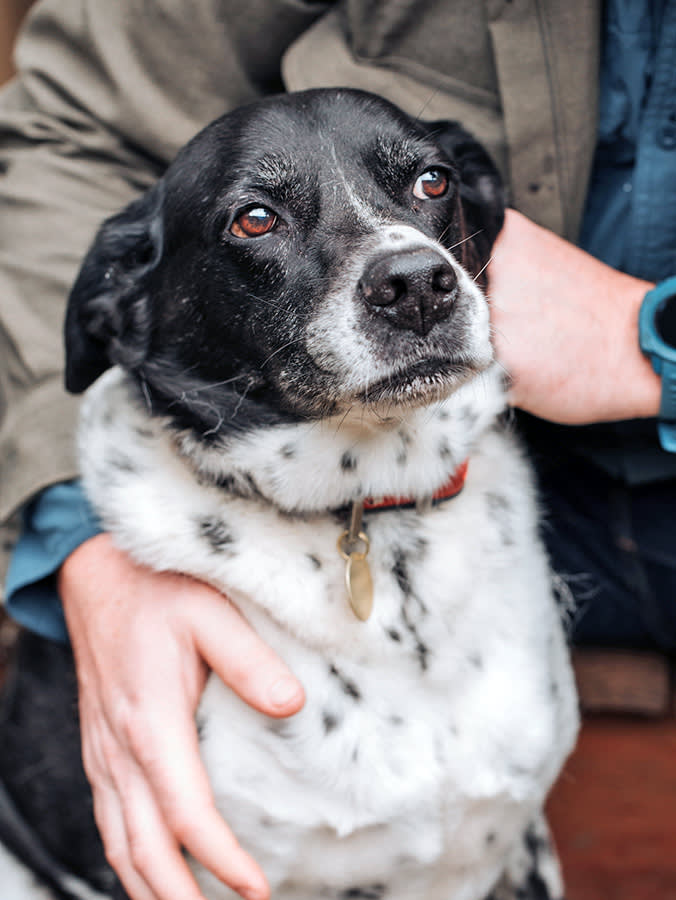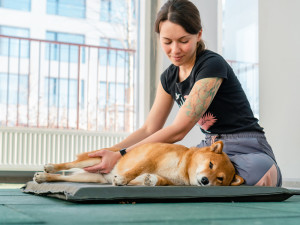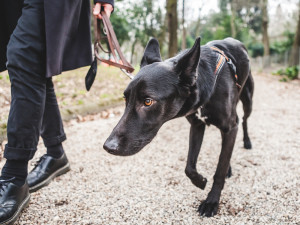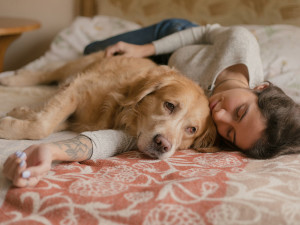Do Dogs Actually Get Grumpier as They Age?
You love your curmudgeon. But don’t assume their mood is just caused by old age...

Share Article
Does your old dog seem different to you? Are they listless, irritable, and less tolerant of other dogs or people? Are they more likely to snap when touched or surprised? Less willing to play or go on long walks or vacate a comfy spot on the couch? It’s tempting to think that maybe they are just settling into their Curmudgeon Era.
But is your dog actually getting grumpier, or is it something else? Is grumpiness in dogs even really a thing? Or is the very use of that word — grumpy — just another example of excessive anthropomorphizing by well-intentioned pet parents? And could it be leading you to miss what’s really going on?
“In the sense that ‘grumpy’ means to be bad tempered or irritable, dogs can absolutely be grumpy,” says Ali Smith, dog behaviorist and trainer at Rebarkable.comopens in new tab. “That said, because the term ‘grumpy�’ is often associated with or indicative of a more complex emotional range than dogs are actually capable of, I think it would be more accurate for a person to describe their dog as ‘less tolerant’ or ‘more selective.’”
“When we use the word ‘grumpy’, we tend to disregard or not notice the underlying reasons a dog is acting the way they are,” says Rachel Macdougall, dog trainer and CEO of Soothe and Settleopens in new tab. “If someone tries to rub our dog’s back and she growls, we might brush it off as she’s being grumpy when, really, she has arthritis and pain in her back.”

Look out for physical changes in your pup.
Arthritis is a huge problem among older dogs and any sort of physical pain can, and often does, lead to changes in behavior. Pain can also make it harder for them to deal with changes in their environment — like, say, the arrival of a new baby, the move to a new home, or one of their people getting a new job. It’s not that they simply dislike these changes, it’s that the pain they are dealing with makes it that much harder for them to bear them calmly and quietly.
“There can also be behavior changes associated with hearing or vision loss,” says Kate LaSala, a dog behavior consultant at Rescued by Trainingopens in new tab. “These changes can cause them to startle more easily or sleep more deeply and then be surprised and reactive when they’re awakened.”
“Conditions, such as canine cognitive dysfunction (CCD) — sometimes referred to as ‘doggie dementia’ — can also occur,” Macdougall says. “This can lead to confusion, increased anxiety, and sudden aggressive behaviors towards people or other animals, even if they did not display such behaviors before.”
Depending on your dog’s breed, they could also be predisposed to certain painful physical ailments that make aging that much more uncomfortable. Because of their long bodies, Dachshunds are prone to back injuries and spinal-disk problemsopens in new tab. German Shepherds opens in new tab and other large-dog breedsopens in new tab are more likely to suffer from hip dysplasia, which can make it difficult to walk.
Labrador Retrievers can be prone to obesityopens in new tab, Boxers are said to be susceptible to canceropens in new tab, Spaniels to ear infectionsopens in new tab, Poodles to some types of glaucomaopens in new tab, Doberman Pinschers to heart conditionsopens in new tab like dilated cardiomyopathy. The list goes on and on and, more often than not, pets will suffer from these ailments long before their people realize there is anything wrong with them.
And then take action — with the help of your vet.
That’s why it is so important to treat any changes in your dog’s behavior with the seriousness and urgency they deserve. “Be really observant,” Smith says. “If you notice they are limping sporadically or that they aren’t as playful as they used to be, take them to a really good vet and get them checked out. And if the vet brushes you off by saying something like ‘it’s just old age,’ take them to someone else. Someone who will conduct tests to facilitate an actual diagnosis.”
Once you and your vet figure out exactly what is wrong with your dog, you can address any medical issues head-on. You can provide them with painkillers and other therapies. You can also change your dog’s diet to help manage their weight and reduce pressure on their joints and muscles. “A lot of people don’t know this, but you shouldn’t feed your dog the same food their whole life,” Macdougall says. “And most dogs require specific weight-management interventions as they get older [and their bodies and metabolisms change].”
You can also make whatever non-medical changes are necessary in order to ensure your dog is as comfortable as possible. This could mean installing ramps to get them onto and off of the bed or couch, carrying them up and down the stairs, or substituting high-impact activities like fetch or long walks with gentle-stimulation toys for a less physically rigorous form of enrichment.
It could also be as simple as advocating for them when they are out in public: Make sure people know your dog is elderly and maybe doesn’t want to be touched or needs a little more time and space to adjust before interacting.
Call your dog grumpy if you want. Just as long as it doesn’t stop you from doing what you can to make their golden years as comfortable as possible. You’ll be glad you did. And so will they.

Charles Manning
Charles Manning is an actor and writer based in New York City. In his free time he likes to cook, go swimming at the public pool, volunteer at the LGBTQ senior center, and foster senior and special-needs cats. His work has previously appeared in Cosmopolitan, Elle, Marie Claire, Harper’s Bazaar, Seventeen, and Nylon.
Related articles
![Brown dog with golden eyes leaning on fence]()
Is Your Senior Dog Sundowning?
If your senior dog seems confused, restless, or irritable after dark, they may have sundowners syndrome. Here’s how to deal.
![Dog lying on the wood floor is bathed in the sunset light]()
When Your Dog Gets Alzheimer’s
For dogs with Alzheimer’s, confusion may reign as light falls.
![Woman with arm tattoos and wearing a black t-shirt stretching out the back legs of a Shiba Inu dog laying on a dark green mat]()
Does Your Dog Need a Massage?
Help your dog stay fit and flexible with these stretch techniques by a certified pet strength and conditioning specialist.
![Young caucasian cheerful blonde girl sitting and hugging her lovely cocker spaniel dog in cafe.]()
10 Longevity Tips From People Whose Pets Have Lived Incredibly Long Lives
Follow these vet-backed tips to help your best bud live a healthy and full life.
![Shy black dog walking with owner at the park.]()
How to Help an Anxious Dog Conquer Their Fears
Pro tips for boosting the confidence of a scaredy-cat dog.
![Shy black dog walking with owner at the park.]()
How to Help an Anxious Dog Conquer Their Fears
Six animal behaviourists share pro tips for boosting the confidence of a fearful dog
Does Your Dog Need Anti-Anxiety Meds?
How to cope with dog anxiety—from training to medication.







